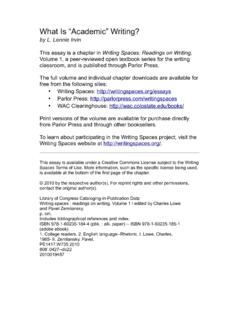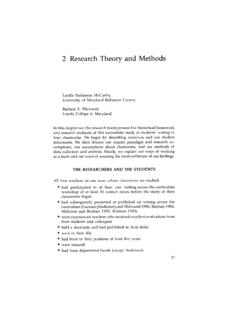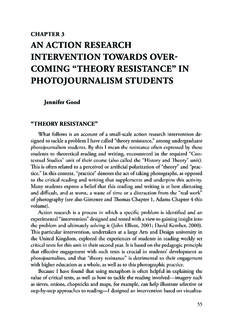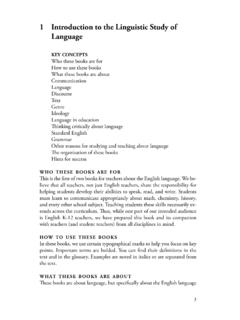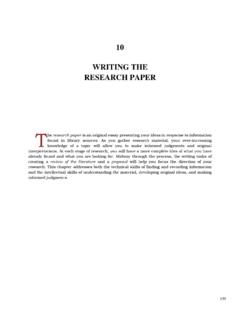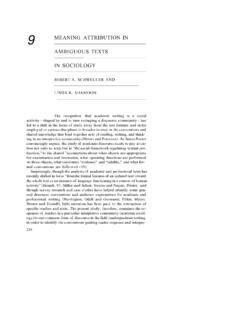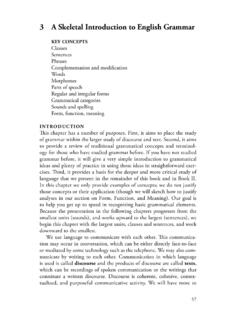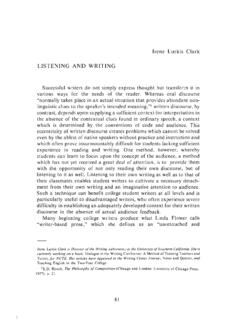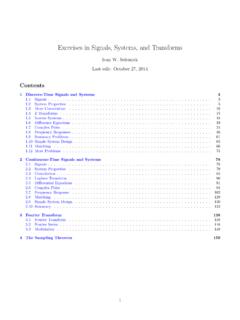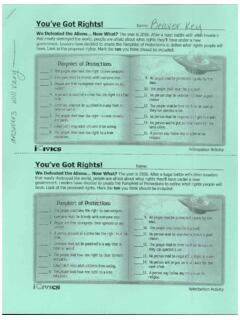Transcription of So You’ve Got a Writing Assignment. Now What?
1 So You've Got a Writing Assignment. Now What? by Corrine E. Hinton This essay is a chapter in Writing Spaces: Readings on Writing , Volume 1, a peer-reviewed open textbook series for the Writing classroom, and is published through Parlor Press. The full volume and individual chapter downloads are available for free from the following sites: Writing Spaces: Parlor Press: WAC Clearinghouse: Print versions of the volume are available for purchase directly from Parlor Press and through other booksellers. To learn about participating in the Writing Spaces project, visit the Writing Spaces website at This essay is available under a Creative Commons License subject to the Writing Spaces Terms of Use. More information, such as the specific license being used, is available at the bottom of the first page of the chapter. 2010 by the respective author(s). For reprint rights and other permissions, contact the original author(s).
2 Library of Congress Cataloging-in-Publication Data Writing spaces : readings on Writing . Volume 1 / edited by Charles Lowe and Pavel Zemliansky. p. cm. Includes bibliographical references and index. ISBN 978-1-60235-184-4 (pbk. : alk. paper) -- ISBN 978-1-60235-185-1. (adobe ebook). 1. College readers. 2. English language--Rhetoric. I. Lowe, Charles, 1965- II. Zemliansky, Pavel. 2010. 808'.0427--dc22. 2010019487. So You've Got a Writing Assignment. Now What? Corrine E. Hinton It's the first day of the semester and you've just stepped foot into your Intro to American Politics class.* You grab a seat toward the back as the instructor enters, distributes the syllabus, and starts to discuss the course schedule. Just before class ends, she grabs a thin stack of papers from her desk and, distributing them, announces, This is your first Writing assignment for the term. It's due two weeks from Thursday, so I suggest you begin early.
3 Your stomach clenches. For some peo- ple, a Writing assignment causes a little nervous energy, but for you, it's a deep, vomit-inducing fireball that shoots down your body and out your toes. As soon as the assignment sheet hits your hands, your eyes dart wildly about, frantically trying to decipher what you're sup- posed to do. How many pages is this thing supposed to be? What am I supposed to write about? What's Chicago style? When is it due? You know your instructor is talking about the assignment right now, but her voice fades into a murmur as you busy yourself with the assign- ment sheet. The sound of shuffling feet interrupts your thoughts; you look up and realize she's dismissed the class. You shove the assignment into your bag, convinced you're doomed before you've even started. * This work is licensed under the Creative Commons Attribution- Noncommercial-Share Alike United States License and is subject to the Writing Spaces Terms of Use.
4 To view a copy of this license, visit http://. or send a letter to Creative Commons, 171 Second Street, Suite 300, San Francisco, California, 94105, USA. To view the Writing Spaces Terms of Use, visit http://writingspaces. org/terms-of-use. 18. So You've Got a Writing Assignment 19. So you've got a Writing assignment. Now what? First, don't panic. Writing assignments make many of us nervous, but this anxiety is es- pecially prevalent in first year students. When that first Writing assign- ment comes along, fear, anxiety, avoidance, and even anger are typical responses. However, negative emotional reactions like these can cloud your ability to be rational, and interpreting a Writing assignment is a rational activity and a skill. You can learn and cultivate this skill with practice. Why is learning how to do it so important? First, you can learn how to manage negative emotional responses to Writing .
5 Research indicates emotional responses can affect academic performance over and above the influence of cognitive ability or mo- tivation (Pekrun 129). So, even when you have the knowledge or de- sire to accomplish a particular goal, your fear, anxiety, or boredom can have greater control over how you perform. Anything you can do to minimize these reactions (and potentially boost performance) benefits your personal and intellectual wellness. Learning to interpret Writing assignment expectations also helps encourage productive dialogue between you and your fellow class- mates and between you and your instructor. You'll be able to discuss the assignment critically with your peers, ask them specific questions about information you don't know, or compare approaches to essays. You'll also be able to answer your classmates' questions confidently. Many students are too afraid or intimidated to ask their instructors for help, but when you understand an instructor's expectations for an assignment, you also understand the skills being assessed.
6 With this method, when you do not understand a requirement or expecta- tion, you'll have more confidence to approach your instructor directly, using him as valuable resource that can encourage you, clarify confu- sion, or strengthen your understanding of course concepts. What follows is a series of practical guidelines useful for interpret- ing most college Writing assignments. In my experience, many students already know and employ many of these strategies regularly; however, few students know or use all of them every time. Along the way, I'll apply some of these guidelines to actual assignments used in university classrooms. You'll also be able to get into the heads of other students as they formulate their own approaches to some of these 20 Corrine E. Hinton Guidelines for Interpreting Writing Assignments 1. Don't Panic and Don't Procrastinate Writing assignments should not incite panic, but it happens.
7 We've already discussed how panicking and other negative reactions work against you by clouding your ability to analyze a situation rationally. So when your instructor gives you that Writing assignment, don't try to read the whole assignment sheet at breakneck speed. Instead, take a deep breath and focus. If your instructor talks about the assignment, stop what you're doing and listen. Often, teachers will read through the assignment aloud and may even elaborate on some of the require- ments. Write down any extra information or advice your instructor provides about the requirements, his or her expectations, changes, pos- sible approaches, or topic ideas. This information will be useful to you as you begin thinking about the topic and formulating your approach. Also, pay attention to your classmates' questions. You might not need those answers now, but you may find them helpful later. If you're an undergraduate student taking more than one class, it's not uncommon to have several Writing assignments due within days of each other.
8 Hence, you should avoid procrastinating. People procrasti- nate for different reasons. Maybe you wait because you've always been able to put together a decent paper the night before it's due. Perhaps you wait because avoiding the assignment until the last minute is your response to academic stress. Waiting until the last minute to complete a Writing assignment in college is a gamble. You put yourself at risk for the unexpected: your printer runs out of ink, your laptop crashes and you didn't backup your work, the Internet in the library is down, the books you need are checked out, you can't locate any recent research on your topic, you have a last-minute emergency, or you have a ques- tion about the assignment you can't find the answer to. The common result of situations like these is that if the student is able to complete the assignment, it is often a poor representatatoin of her actual knowl- edge or abilities.
9 Start your assignment as soon as possible and leave yourself plenty of time to plan for the unexpected. 2. Read the Assignment. Read It Again. Refer to It Often The ability to read critically is a useful skill. When you read a text- book chapter for your history course, for example, you might skim it So You've Got a Writing Assignment 21. for major ideas first, re-read and then highlight or underline impor- tant items, make notes in the margins, look up unfamiliar terms, or compile a list of questions. These same strategies can be applied when reading Writing assignments. The assignment sheet is full of material to be deciphered, so attack it the same way you would attack your history book. When Bailey2, an undergraduate at a university in Los Angeles, was asked to respond to a biology Writing assignment, here's what she had to say about where she would start: When getting a Writing assignment, you should read it more than once just to get a knowledge of what they're [the instructors] really asking for and under- line important information, which is what I'm doing now.
10 Before starting the assignment, always write some notes down to help you get started. Here are some other strategies to help you become an active, critical reader of Writing assignments: 1. Start by skimming, noting anything in particular that jumps out at you. 2. As soon as you have the time and the ability to focus, re-read the assignment carefully. Underline or highlight important features of the assignment or criteria you think you might for- get about after you've started Writing . 3. Don't be afraid to write on the assignment sheet. Use the available white space to list questions, define key terms or concepts, or jot down any initial ideas you have. Don't let the margins confine your Writing (or your thoughts). If you're running out of space, grab a fresh sheet of paper and keep Writing . The sooner you starting thinking and Writing about the assignment, the easier it may be to complete. As you begin drafting, you should occasionally refer back to the of- ficial assignment sheet.

